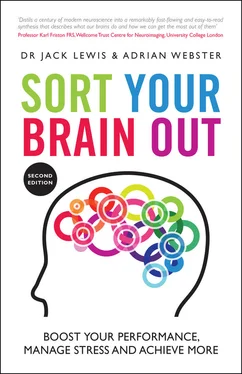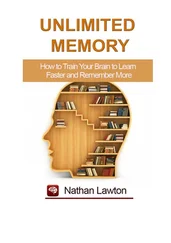In adulthood, however, we have more freedom of choice and can exert much more free will over what we will and will not spend our time doing. Not surprisingly this means that we tend to gravitate towards activities that we are good at, enjoy doing or at least remain squarely within our comfort zone; “set‐pieces” that through repetition have become so well known to our brains that we barely register how we're doing whatever we're doing.
Unfortunately, this means we become more and more unfamiliar with the feeling of struggling to grasp a new idea or skill. Out of practice in dealing with such feelings, we either don't engage with it fully or try to dodge it entirely. It's human nature to be drawn towards activities that increase our sense of well‐being and to be repelled by those that decrease it. Alas, in doing this, we inevitably turn ourselves into set‐piece specialists. In fact, most people spend their entire adult lives doing things they have done many times before because those activities can be done with the least amount of cognitive effort and the smallest possibility of generating feelings of inadequacy.
We like to operate on autopilot because it's less hassle, less stressful and tends to reduce anxiety. The problem is that the easiest route in the short term is rarely the best path in the long run. And if there's one weakness that we humans often fall foul of, it's our tendency to choose the immediate, easy reward and worry about any long‐term drawbacks later (or better still, never).
See if you can do something that you've done many times before, probably without thinking about it, but this time do it slightly differently.
Try signing your name really slowly.
Difficult, isn't it!? That's a motor “set‐piece” right there – an automatic action made inaccurate by too much thought.
Throughout most of human history, becoming a set‐piece specialist was absolutely fine. You spent childhood learning the basics, adolescence becoming a cog in some machine or another and adulthood winding that cog via a repertoire of set‐pieces in a job for life, putting food on the table to feed hungry mouths who themselves would, in turn, go through more or less the same life transitions.
The world, however, has changed since those days. The world has always been changing but, as we humans have become more and more adept at controlling and manipulating the environment around us, that rate of change has steadily accelerated. This has certainly been the case since the Industrial Revolution, when machines started getting involved. The changes used to only really be noticeable from one generation to the next. Then, during the 20th century – when great technological leaps impacting daily life started happening more regularly – they became readily apparent from one decade to the next.
Now, in the 21st century, everything has gone and sped up again! New innovations are continually impacting on the way we work, how we socialize, how we raise children, what we do for entertainment and how we think – fast, continuous, unprecedented change that is influencing every aspect of our lives. This increases the environmental pressure on our brains to adapt and keep up with the breakneck pace.
But fear not, your brain is more than up to all this. If there's one thing above all others that is most impressive about your brain, it's the degree to which it can change to adapt to all the new challenges that will inevitably crop up. This is exactly the feature that made us humans the most dominant species on the planet in the first place.
We are incredibly adaptable. Our brains will gradually change to serve us better in any given environment. Our collective ingenuity has led to the development of a variety of tools with which we can sculpt our environment. By creating new environments and carefully choosing which environments we immerse ourselves in on a regular basis, we can in fact change our own brains. It may sound miraculous. It is!
IQ stands for Intelligence Quotient and is the world's most popular and well‐known intelligence test. Up until the end of the 20th century the broadly held assumption was that once a person hit adulthood their IQ score would remain stable for the rest of their life. Then along came an ingenious Kiwi psychologist by the name of James Flynn, who noticed something curious. When he compared IQ scores of the same people, from one IQ test to the next taken a few years later, they'd gone up. We now know that IQ scores around the world have increased by an average of three IQ points every ten years!
What is driving this increase in intelligence? As far as we can tell it is driven by an increase in consumption of information and the extensive use of a steady flow of new technologies. From decade to decade the amount of information we have access to has dramatically increased, first via television and then through the internet. The more information our brains have to juggle on a daily basis, it seems, the higher our IQs go!
To get the best performance out of your brain, you should bear in mind what modern neuroscience has taught us are the rules of the game. Your brain will physically rewire the connections between brain areas involved in any regularly used mental ability so that the interactions between them are:
Faster
Stronger
More efficient
To improve your skill you must take care to perform the desired mental function:
Regularly (ideally daily)
Intensively (tackle challenges that stretch your abilities)
Over long periods of time (keep up the training over many weeks)
This essentially describes what is popularly described these days as “brain training.” It might sound terribly impressive and you might even have been misled into thinking that you need some special kit to do it properly, but that really isn't strictly necessary.
With a whole bunch of useful brain teasers in an easily portable package, brain training applications on various devices could make brain training more convenient. This convenience might even improve your devotion to self‐improvement. Market‐leading companies may well have millions of subscribers for their particular games, but popularity doesn't guarantee effectiveness. Just remember that you are training your brain whenever you engage in anything that taxes your grey matter regularly, intensively and over long periods of time.
Working memory is what you use to keep a phone number in your head for long enough to dial the number. You also use it any time you plan what you're going to do with your day or try to solve a problem. Sights, sounds and any other relevant pieces of information can be held in mind on the “Hold Line” (see Outward‐Facing Brain Tube map in the Appendix) for just long enough to perform a mental task effectively.
Experiments investigating brain training have found that certain exercises increase working memory capacity (e.g. the “Dual N‐Back” training task) and being able to simultaneously hold more information in mind supports many other useful cognitive capabilities. In fact, if we can improve our working memory, our IQ score will increase thanks to its positive impact on “fluid” intelligence.
As you improve at any skill, hobby or mental ability you are engaging in brain training. There is no evidence so far to suggest some kind of magic ingredient in the commercially available games – just convenience. The convenience might make a difference in helping you to keep going for long and hard enough to have a tangible impact in how your brain functions, in those games, at least. Sadly, any hard evidence that improvements in the games can translate into benefits in everyday life is suspiciously minimal. To gain the full benefits of “brain training” you'd probably be better off taking up a few new hobbies instead.
Читать дальше












